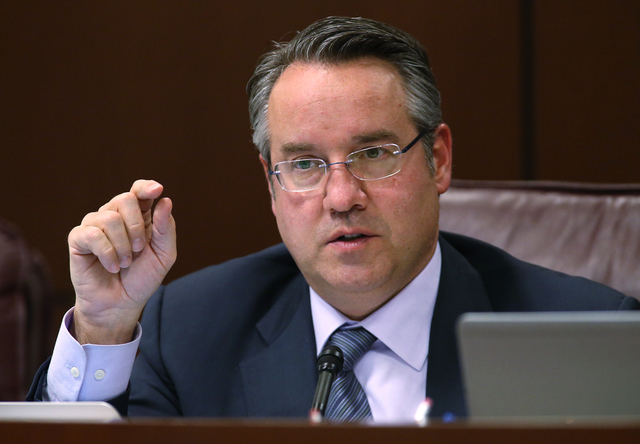NLV mayor backs bankruptcy power for cities, counties

CARSON CITY — A bill that would permit Nevada cities and counties to file for Chapter 9 bankruptcy protection was endorsed Friday by North Las Vegas Mayor John Lee.
Senate Bill 475, which was heard by the Senate Government Affairs Committee, would allow the bankruptcy if the state Tax Commission found that a severe financial emergency existed and was expected to last at least three years.
It would also require such a bankruptcy petition to be reviewed and approved by the governor and attorney general before it could be filed.
Efforts would be made to avoid a bankruptcy filing which would only be a last resort. The committee did not take action on the measure.
Lee said in a letter supporting the bill that existing law fails to provide sufficient relief for distressed cities and counties. Cities and counties lack the tools necessary to ensure all stakeholders share an equal burden in a financial crisis, he said.
“I want to make it very clear: North Las Vegas does not need bankruptcy,” Lee said. “Even if existing law had allowed for municipal bankruptcy, North Las Vegas would not have sought its protection.
“However, I am convinced the existence of municipal bankruptcy in Nevada would have been a game changer for our negotiations and would have ensured all stakeholders shared equally in the burden of saving our town,” he said.
Current law allows local governments suffering from a fiscal emergency to receive assistance from the Department of Taxation and the Committee on Local Government Finance.
Lee said in May 2014 that the option of municipal bankruptcy would bring everyone to the table to find a solution in a financial emergency.
The Review-Journal reported in May 2014 that North Las Vegas faces continued declines in property tax revenue and ballooning payments on an estimated $422 million in outstanding debt obligations, a financial position that bond analysts at Fitch have likened to bankrupt municipalities in California and Pennsylvania.
Officials hope the specter of state-sanctioned bankruptcy would encourage bondholders to renegotiate those bonds in time to thwart a $7 million uptick in annual bond payments scheduled to hit the city’s books in 2016, the report said.
“Just having that threat there could make a world of difference,” Mayor’s Office Chief of Staff Ryann Juden said in May 2014. “We may never have to use it, but having it there would help out a lot.”
The bill was opposed by Barbara Flickinger, managing director of portfolio surveillance for the National Public Finance Guarantee Corp., who said in a letter that there are viable alternatives to bankruptcy.
“The most important ‘tool in the toolbox’ for distressed municipalities is fiscal discipline, a consistent focus on cost controls and revenue growth,” she said.
Bankruptcy is also expensive and time consuming, Flickinger said, noting that Detroit’s recently concluded bankruptcy cost over $180 million of taxpayer money for legal and other professional fees. It also took 18 months to resolve.
Access to Chapter 9 creates uncertainty which translates into higher interest rates on debt, she said.
“This perception will impact the cost of borrowing for local governments across the state, not just those in distress,” she said.
Marlene Lockard, representing the Nevada Service Employees International Union, also testified in opposition. She said there is another measure in the Assembly that addresses municipal financial emergencies short of bankruptcy that is a preferable alternative.
Contact Sean Whaley at swhaley@reviewjournal.com or 775-687-3900. Follow @seanw801 on Twitter.












